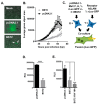BST2/Tetherin Overexpression Modulates Morbillivirus Glycoprotein Production to Inhibit Cell-Cell Fusion
- PMID: 31366072
- PMCID: PMC6723339
- DOI: 10.3390/v11080692
BST2/Tetherin Overexpression Modulates Morbillivirus Glycoprotein Production to Inhibit Cell-Cell Fusion
Abstract
The measles virus (MeV), a member of the genus Morbillivirus, is an established pathogen of humans. A key feature of morbilliviruses is their ability to spread by virus-cell and cell-cell fusion. The latter process, which leads to syncytia formation in vitro and in vivo, is driven by the viral fusion (F) and haemagglutinin (H) glycoproteins. In this study, we demonstrate that MeV glycoproteins are sensitive to inhibition by bone marrow stromal antigen 2 (BST2/Tetherin/CD317) proteins. BST2 overexpression causes a large reduction in MeV syncytia expansion. Using quantitative cell-cell fusion assays, immunolabeling, and biochemistry we further demonstrate that ectopically expressed BST2 directly inhibits MeV cell-cell fusion. This restriction is mediated by the targeting of the MeV H glycoprotein, but not other MeV proteins. Using truncation mutants, we further establish that the C-terminal glycosyl-phosphatidylinositol (GPI) anchor of BST2 is required for the restriction of MeV replication in vitro and cell-cell fusion. By extending our study to the ruminant morbillivirus peste des petits ruminants virus (PPRV) and its natural host, sheep, we also confirm this is a broad and cross-species specific phenotype.
Keywords: BST2; MeV; Morbillivirus; PPRV; haemagluttinin; measles; tetherin.
Conflict of interest statement
The authors declare no conflict of interest, financial or otherwise.
Figures






References
-
- World Health Orgnization Measles (Fact Sheet No 286) [(accessed on 24 July 2019)]; Available online: www.who.int/mediacentre/factsheets/fs286/en/
Publication types
MeSH terms
Substances
Grants and funding
LinkOut - more resources
Full Text Sources

